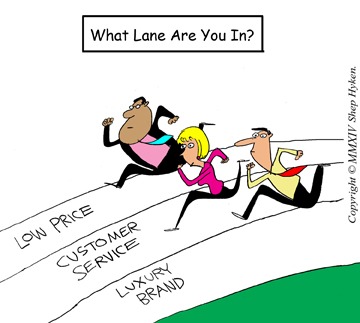 Customer Experience
Customer Experience
The best companies know what they are good at, and they “stay in that lane.” For example, Ace Hardware is known for its helpful customer service. Nordstrom is known for their brand of legendary service. Zappos is known for their amazing service. What none of these companies are known for is being the low price leader. It’s not that they are high priced either. They are competitively priced and have chosen to compete by delivering value with their customer service. That’s their lane: customer service.
Sure, at certain times all of these companies have sales and discounted items. I love the semi-annual sales at Nordstrom. Some great buys can be found. But those are just twice a year, and even with the sale, you still get the great Nordstom experience.
On the flip side, you have the Dollar Stores. They advertise an incredibly low priced product. The bargains are sometimes amazing. But, unlike Nordstrom or Ace Hardware, you don’t find sales experts standing in the aisles ready to serve and help the customer. What you usually will find are friendly people at the cash register who smile and say thank you as they take your money and hand you your bag of merchandise. It’s important to note that there is nothing wrong with that. It works well for them. It’s their plan; their focus. It’s the lane they’ve chosen to be in.
What really got me thinking about this was the recent news of Radio Shack closing about 20% of their stores. All reports indicate that they are struggling. Or, just like any savvy retail chain, they may just be ridding themselves of low volume stores. How could this happen to a retail industry icon? I may not have the entire answer; however I have a theory of what could have contributed to Radio Shack’s current situation.
First of all, I love Radio Shack, and I admit to being a little bit of a geek. As a kid, I loved going to the Radio Shack store and getting what I needed for cool projects. I continue to go to their stores on occasion to buy some electronic accessories. However, the store I visit in the mall today is very different than the store I remember as a kid. I remember going to Radio Shack for things I couldn’t get elsewhere; batteries, wire and cables. They also had cool merchandise that other stores didn’t sell. Today, their merchandising doesn’t give me that impression. Are they in the “hard-to-find-in other-stores” electronics business, the phone business, or the TV business? Are they competing with Best Buy and other consumer electronic stores? At some point they switched lanes, but I’m still not sure which lane they switched.
Now even though I’ve opened the door a bit on Radio Shack’s strategy, that’s not the discussion I want to get into. This is just an observation that made me think of companies that struggle because they can’t choose a lane and stay in it.
Back to the companies mentioned earlier; Ace Hardware, Nordstrom and Zappos.com. We know what lane these companies play in. We know what they stand for. There is no confusion. They have chosen to compete with customer service, and they have done quite well. That lane is obvious. Walmart and Dollar Stores choose to compete on price, another obvious lane. Less obvious lanes might be companies known for industry specific merchandise or very high end merchandise.
So, the question is this: Do your customers know what lane you are in? Making a lane change in business isn’t illegal. You won’t get a ticket. But, if not done properly, you will confuse the customer, which reminds me of what someone once said: “A confused customer won’t buy.”
(By the way, if you know who said, “A confused mind won’t buy,” let me know. Our search for the source of this quote didn’t give us a definitive answer.)




This is right on point, and an important subject. For several decades, I’ve been consulting with clients on how to develop positioning and communication clarity, eliminating what I describe as “fuzzy value propositions”. Nordstrom, The Container Store, Zappos,and IKEA all represent clear positioning and perceived value to customers. Radio Shack, Penney’s, and Sears do not, and they are suffering for it: http://customerthink.com/if_you_don_t_know_where_you_re_going_with_customers_any_road_will_get_you_there/